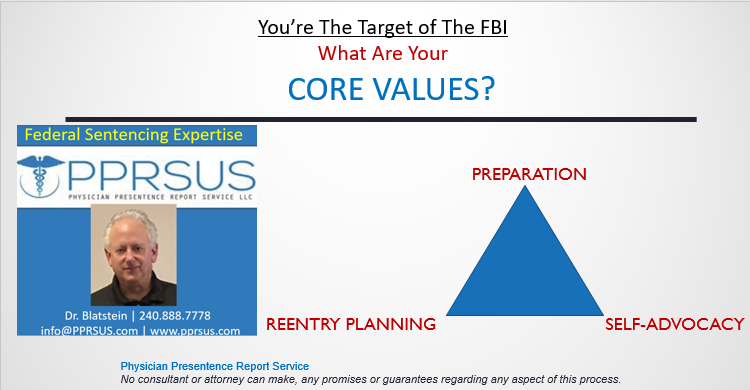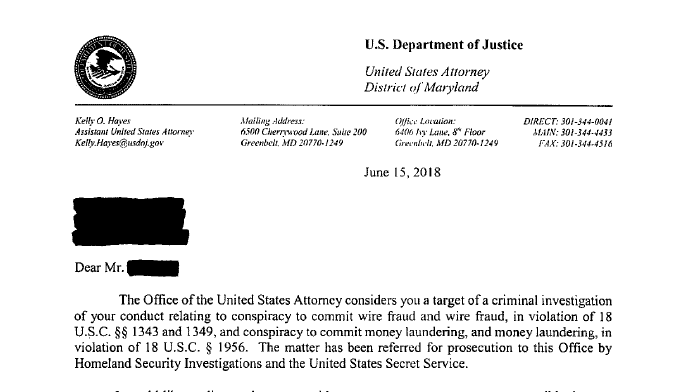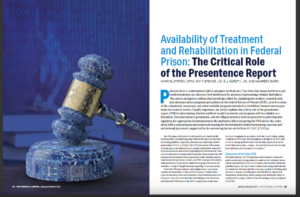You’re Target #1, The FBI’s Coming
It’s MORE THAN WHISPERS
You’re Going to Prison, – There is no way to Dress this up – BUT
If the Rumors and whispers that the FBI is poking around are true…
I’d take that seriously
HELLO AND WELCOME, MY NAME IS MARC BLATSTEIN AND I AM THE PHYSICIAN WHO FOUNDED THE PHYSICIAN PRESENTENCE REPORT SERVICE
AFTER 30+ years IN PRACTICE
MY MORNING WAS interrupted by the feds at 6 am knock at my front door, and a 2nd at 8 am at my medical practice – interrupting my patients and staff, all for a problem that I created.
As I was Guilty, – I Plead to a Felony and was convicted of a federal White-Collar crime, and was sentenced to time in the BOP as a Justice-Impacted Person.
After my release, and several years of hard work, my license was fully restored in 2010.
Around that time;
· I chose to use my skills in medicine
· with my understanding of the BOP
· to assist those of you,
· who like me,
· find themselves facing our Criminal Justice System.
While I found myself totally UNPREPARED
I Made It My Mission
TO PROVIDE YOU WITH THE RESOURCES
That You Will Need
SO, YOU’LL BE PREPARED- BECAUSE
IN PRISON – AS IN LIFE
PREPARATION = SURVIVAL
WHILE YOUR STAY IN PRISON WILL BE TEMPORARY (and a bit UNSETTLING)
The Goal Is To Be Productive
FOLLOW YOUR REENTRY PLAN
and
Get Home As Soon As Possible
So let’s get to it!
If you’re hearing FBI whispers,
• Start interviewing attorneys, ask questions, get references,
• Sentencing Memorandum, ask to read samples written for previous clients, are they boilerplate?
• Then, be honest with your attorney, and yourself – no surprises.
PSI Preparation is crucial – You Are your best and only Advocate
Ask yourself:
• Do you have confidence in your defense?
• Do you need additional team partners who are specialized in,
- Sentencing Mitigation, Allocution, Personal Narrative, and Reentry Release Planning Advocacy
• All Before Your Presentence Interview
If Not, there are No Redo’s ⇒ this is Your Future ⇒ Speak up now
PREPARATION and SELF-ADVOCACY are your CORE VALUES
PREPARATION:
• Attorney Interview, Working together – must be a Joint Defense
- Decision #1: Trial or Plea
• PRACTICE: Your Allocution (& Memorandum), for the Sentencing Hearing
- Your Personal Narrative could take a month+ to write
- The Memorandum is given by your Attorney
• Your Presentence Interview (PSI)
- Know Your Narrative → weave it into your conversation with your PO, for placement into your Presentence Report (PSR), which is now complete.
SELF-ADVOCACY:
• Relies on the skills that made you successful, some being “Self-Motivated”
• At your Attorneys request, your Personal Narrative was included in Your PSR
• Reentry Planning
• Sentence Mitigation Strategies are employed Before Sentencing, and During Incarceration
YOUR PREPARATION
Working Together With Your Attorney At Every Stage
1st) Be honest with your attorney, about everything –
• Plea or Trial – Nobody wants surprises
2nd) Your PSI, needs to include everything about you.
• In addition to all your Biographical Background information
• Medical, Character References, Education, Legal, Etc.
• Your attorney has connected with your PO before your Interview to;
- get a “pulse” on how much they know, to
- present their case/defense strategy
- and learn the date the PO must have their final PSR completed
• RDAP (if applicable), Include it now
• If is not there, and you need it later to reduce your time, that may be a big lift.
• Compassionate Release (medical issues, transplant, medications (physician testimony)
• FSA Programs, your attorney will be able to review or know your PSF, and if any of the applicable programs apply;
• Autism, Borderline Personality Disorder, Anger Management, etc.
• Your Personal Narrative needs to be finished before your interview so;
• That you know it, cold, and discuss it in 1st person with your P.O.
• It should be able to be, copy-pasted, directly into the P.O., PSR
• This Is Your Story: In Written and/or Video Format3rd) Time must be allowed for the development of your Personal Narrative, with assistance
4th) The PSR is Now Complete and should Include all the Above, including your Personal Narrative – which Judges want to see.
5th) Time is spent practicing for your sentencing hearing with your attorney regarding,
1. If the Judge is aggregable, due to your allocution, and departs below the guidelines
2. If RDAP is applicable now is when your attorney can ask for it to be put into the order, and if the judge agrees, then
3. Politely, also request for 1 specific BOP prison, based on that RDAP program – using this as an example (camp eligible < 10 years), to also be put into the order.
- Further, should the BOP not be able to do so,
- The BOP could notify the court in writing
- Why they couldn’t make this placement?
SELF-ADVOCACY
Allocution – Your Personal Narrative
Listen To What Federal Judges Have To Say
THE FEDERAL LAWYER • September/October 2019, VIEWS FROM THE BENCH, Own the Mistake and Demonstrate Sincere Remorse
Judge Richard G. Kopf of the District of Nebraska,
Judge Jon D. Levy of the District of Maine in Portland,
Judge Patti Sarris of the District of Massachusetts
Judge Cynthia A. Bashant;
Judge Morrison C. England Jr;…one of the biggest mistakes defense lawyers can make is not having their client answer the question…
Judge Lawrence C. O’Neill,
Judge James K. Bredar—says he comes out on the bench with a sentence already in mind. “Allocution, however, changes this when I see the defendant has insight into the harm he has done.”
NACDL, The Champion • March 2011, Heartstrings or Heartburn: A Federal Judge’s Musings On Defendants’ Right and Rite of Allocution,
Judge Mark Bennett; A Good Allocution Can Be Beneficial
What Federal Judges Want To Hear:
We’re interested in a defendant who has the capability of introspection and who has come to grips with the impact of his offense on others…
“No punishment will be enough. If I could go back and change everything, I would.”
I am persuaded that the defendant is sincere and demonstrates insight into the crime.
Allocution is very important, “I like to have a conversation with the defendant,”…
I want him to apologize to the victim and his or her family, particularly if they are in the courtroom.
“Allocution, however, changes this when I see the defendant has insight into the harm he has done,” when I see the defendant has insight into the harm he has done”
“I am looking for remorse and insight as to why he did what he did and what he is doing to make sure that it doesn’t happen again.
“It’s very important that lawyers prepare a client for allocution, even if they have gone to trial, and do the job that they are retained to do.”
Start paying restitution, even $25/mo, and don’t show up at court in a $900/ month luxury car.

Consultations are on me.
Thank you! Marc
240.888.7778
Physician Presentence Report Service
No matter where you are in The Process, there are things we can do
* No Physician, Attorney, or Consultant can promise any outcomes.








